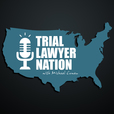
Summary: In this Trial Lawyer Nation podcast, Michael sits down with another trail blazing trial lawyer, Chris Madeksho. Chris recently received a $13.9 million jury verdict on a Mesothelioma case tried in person using social distancing and other safety measures. They discuss Chris’s background, the details and challenges of the case he tried, the safety measures taken, and the numerous strategies Chris used to win this fantastic verdict in the age of COVID-19.<br> Chris specializes in toxic tort and was introduced to the area by his late father, who worked in asbestos installation when he was young and went on to become a trial lawyer. He began his practice in Texas, but later moved his principal office to California due to Texas tort reform. As most great trial lawyers do, he then attended the Trial Lawyers College and began learning from the other great trial lawyers and scholars in the arena, citing <a href="https://triallawyernation.com/episode/50-sari-de-la-motte/" target="_blank" rel="noopener noreferrer">Sari de la Motte</a>, <a href="https://triallawyernation.com/episode/12-eric-penn/" target="_blank" rel="noopener noreferrer">Eric Penn</a>, <a href="https://triallawyernation.com/episode/58-nick-rowley/" target="_blank" rel="noopener noreferrer">Nick Rowley</a>, <a href="https://triallawyernation.com/episode/29-keith-mitnik/" target="_blank" rel="noopener noreferrer">Keith Mitnik</a>, and <a href="https://triallawyernation.com/episode/35-r-rex-parris/" target="_blank" rel="noopener noreferrer">R. Rex Parris</a>.<br> Michael then asks Chris about the details of the case he tried. Chris’s client was a 68-year old Mesothelioma patient who worked as an asbestos installer from ages 9 to 19. Because of some criminal details in his background, Chris was forced to drop the loss of consortium claim and only request damages in personal injury, BUT was still awarded $13 million in non-economic damages alone.<br> With this impressive verdict, Michael asks Chris if the defense wanted to try the case or not. Chris responds with a resounding, “No.” In fact, they even opposed Chris’s waiver of jury when he attempted to get a bench trial. So Chris pushed forward, complied with the judge’s orders, and was completely prepared for trial when the time came.<br> Chris then explains how the jury summons and voir dire process was handled safely. The summonses were sent out via email and included COVID-19 hardship questions. He shares how we know our most dangerous jurors are people who are not afraid of COVID-19, but our second most dangerous jurors are people who are there who don’t want to be. Eliminating people who don’t want to be there was very helpful in that respect.<br> But, a jury summons by email has its downfalls. The biggest being that the demographics of the jury pool were not representative of the populous. The resulting jury was more affluent, more connected with technology, and more conservative than a typical King County jury would be. But as Chris puts it, “When you have a client who’s going to die if you don’t try the case now, you just do the best you can.”<br> After summoning the jury pool, voir dire was conducted mostly through Zoom with only two panels attending in person due to security concerns. These in person panelists were separated by a 6-foot spacer and their voir dire took place in a convention center to allow for safe distancing. While Chris believes he connected better with the in-person panelists, the resulting jury ended up being comprised of 14 virtual panelists and only 1 in person panelist.<br> The pair then move on to discuss Chris’s storytelling strategy. Chris explains how he’s worked extensively with Sari de la Motte and employed many of her <a href="https://www.trialguides.com/products/from-hostage-to-hero" target="_blank" rel="noopener noreferrer">Hostage to Hero</a> strategies to craft his opening and closing arguments. He also emphasizes the importance of being “at ease” when speaking to ...
